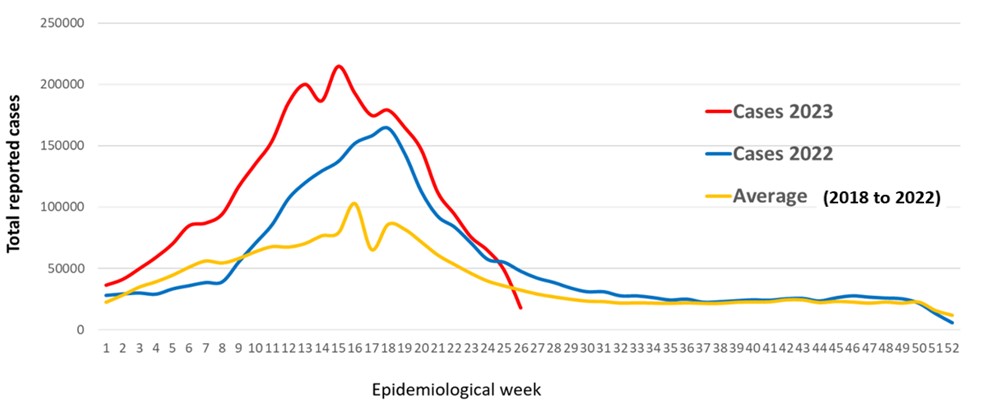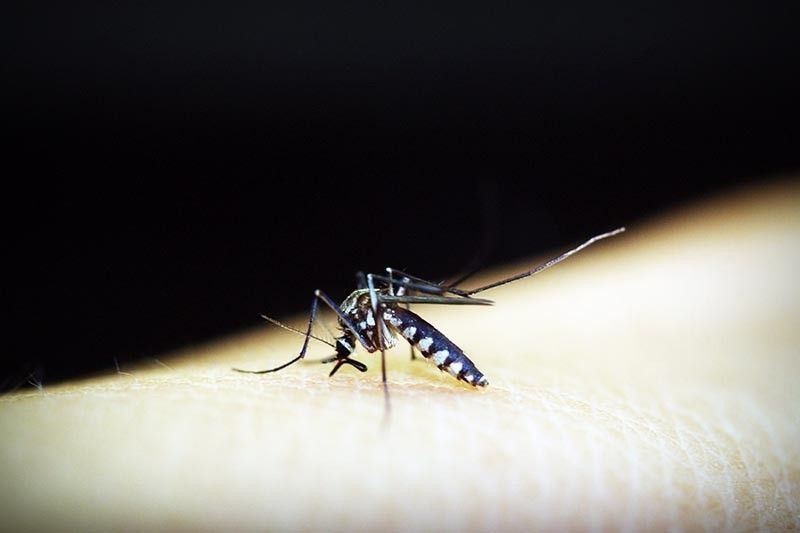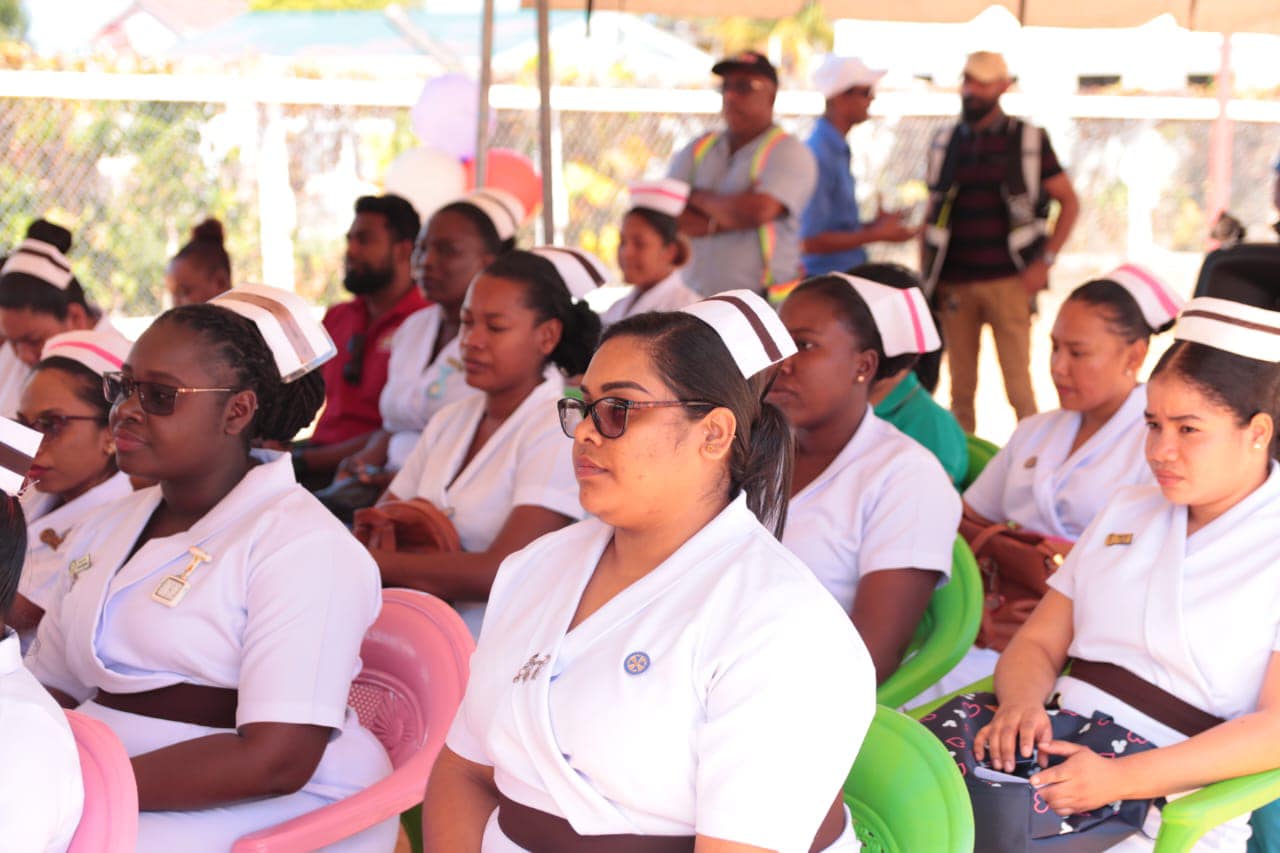By Vishani Ragobeer
Guyana, like many countries in the Americas, experienced a surge in dengue cases over the last few months, and some experts believe that the surge is linked to climate change.
Guyana’s Ministry of Health confirmed that 11 people have died so far this year after contracting the disease. Health Minister, Dr. Frank Anthony, told the News Room that six children were among those who died.
More than 2,100 cases have been recorded in Guyana so far this year. Dengue isn’t a new disease here, but the number of cases and deaths is higher than usual.
Similar surges have been recorded around the world. The World Health Organization (WHO) last month noted that about three million cases had been reported in the Americas alone for the year so far.

And the WHO also said the spike in cases is due to global warming, the long-term heating of the earth’s surface. It is part of the worrying phenomenon of climate change.
But is climate change the reason why dengue cases have increased this year?
Infectious Disease Specialist attached to the Georgetown Public Hospital, Guyana’s main referral hospital, Dr. Shazeema Shaw said the increased cases are “possibly” linked to a warmer climate.
But she also noted that millions of dengue cases in nearby countries like Brazil mean that it is possible that the mosquitoes may migrate to Guyana. The improper disposal of garbage and poor water storage may also contribute to mosquito breeding.

The former Executive Director of the Caribbean Public Health Agency (CARPHA), Dr. James Hospedales, also explains that there are several factors, including human behaviour, that contribute to rising dengue cases.
Still, he believes climate change is an important driver that not enough people focus on.
“All the studies that I’ve looked at, including my own experience, is that climate is making dengue worse, both in the level of occurrence and the potential for epidemics,” Dr. Hospedales said.
Finding the links between climate change and public health and raising awareness about those links is part of the work Dr. Hospedales does through the EarthMedic Non-Governmental Organisation (NGO) he founded.
Warmer temperatures and increased rainfall are good for mosquitoes; they breed easier under these conditions. But that doesn’t bode well for human health since more mosquitoes increase the transmission of dengue and other vector-borne diseases.

Dr. Hospedales noted that over the past 30 to 40 years, the climate has been gradually warming. There has been increased rainfall, too.
“And in that time also, one saw that the frequency of dengue outbreaks have been increasing in the region,” the EarthMedic founder pointed out.
VULNERABLE AFFECTED MORE
Dengue has four viral types, and both Dr. Hospedales and Dr. Shaw explained that this means an individual can be infected multiple times. Dr. Hospedales noted that if infected with two types of dengue in quick succession, an individual can get a severe dengue infection, which exacerbates the fevers, aches, and other symptoms.
Of the more than three million cases in the Americas, the WHO said only about 0.13 percent were classified as severe dengue. And there was a case fatality rate of 0.04 percent.
In Guyana, of a total of 2,169 cases, 239 people were hospitalised after showing symptoms associated with severe dengue.
But Dr. Hospedales believes that there should be an increased focus on dengue and the role of climate change in dengue outbreaks. This is especially crucial so that support can be provided to vulnerable groups of people, since they are disproportionately affected.
He explained that persons living in unplanned housing developments, for example, may not have ready access to piped water and, as such, may be storing water in barrels and tanks. If those containers are not covered properly, they can breed more mosquitoes.
The public health physician also noted that people in areas without health centres or easily accessible health centres may be at risk of falling more seriously ill if they do not access much-needed treatment soon enough.
“The dengue is likely to be unfair and uneven in its distribution, more likely to affect poorer communities and people who don’t have access to services,” Dr. Hospedales said seriously.
Dengue fever, as the WHO notes, does not have a specific treatment, and there is no direct drug intervention available. Persons infected with the disease are usually treated with medicines for the fever and pain.
POSSIBLE SOLUTIONS?
Dengue is obviously a disease of concern, especially in the Americas.
Dr. Shaw suggested that persons practise better sanitation. That is, keep your surroundings clean so that mosquitoes don’t find a suitable breeding ground. Water should be stored appropriately, too.
Other protective measures, such as using mosquito coils and sleeping under nets, are advised.
Aside from personal practices, Dr. Hospedales believes that climate adaptation measures should include a focus on safeguarding public health.
“There isn’t a vaccine (for dengue), we don’t have one yet that works, and I don’t see one coming soon.
“So this part of our adaptation to climate change does have to be around looking out for increased infectious diseases such as dengue fever,” he said.
This story was published with the support of the Caribbean Climate Justice Journalism Fellowship, which is a joint venture of Climate Tracker and Open Society Foundations.






